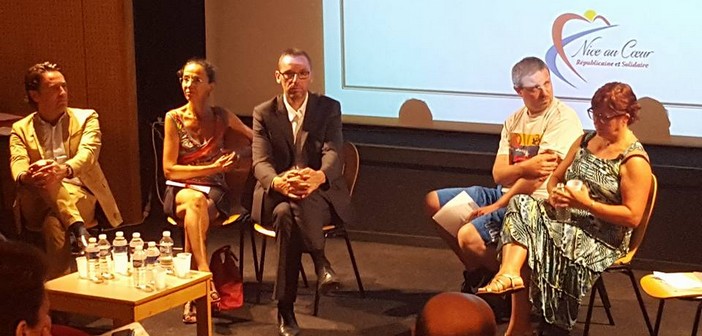After a rather quiet summer, the left (or rather, the lefts because each representative of the various parties and movements participating in this forum was keen to mark their territory and highlight their different positions) is back in the political arena animated or stirred by the primary of Les Républicains.
Patrick Allemand, who has turned to citizen democracy, succeeded in casting a wide net: association activists, citizens, political leaders, felt the importance of the moment and were there to exchange, discuss, and propose in the various workshops and round tables.
Of course, the memory of the July 14 attack weighs heavily in the discussion and the successive drifts, around security, even more so.
The theme chosen for this study day (more than a hundred people were present) was crucial in its mere mention: republican equality.
Already, the definition lends itself to more than one interpretation by its abstract nature and risks being confused with “egalitarianism,” which is a completely different thing. This equality derived from the Constitution is theoretical. Indeed, there are still significant forms of discrimination that are often discreet or invisible.
The Republic seeks to offer equal opportunities, where all opportunities are open concerning social mobility.
The challenge is significant and encompasses the values of the Republic in a society that is overly mediatised and increasingly anxiety-inducing. So, when a society finds itself fragile, it is necessary to strengthen the common house, the Republic. Yes, but how?
The debate highlighted four axes: gender equality, secularism, health, and associative life. Each of these can provide an attempt at a response.
In his conclusions, Patrick Allemand indicated a few paths: “Strengthening the Republic means yielding nothing on the principle of gender equality,” and also “health is one of the most revealing indicators of the failures of republican equality.”
To continue with secularism: “We need to promote secularism because it is the best bulwark against all forms of extremism. Extremism draws its strength from ignorance, as it is often said. Well, let’s act and invest in education!”
Finally, associative life: “We have another weapon in the mobilisation of means to participate in this reconquest, the 1901 law, the associative life. The associative network must be free and totally independent […]; It is it that will promote the participation of the inhabitants and give voice to the ‘voiceless’.”
None of these proposals will alone provide the solution to the problem, but each deserves attention.
Republican equality is a permanent fight, and politics cannot afford long periods. There is always an election around the corner, voices to seek, voters to charm with beautiful promises…
So, we must turn to civil society, ignite the flame of participation, arouse passion for public life, and commit to collective management.
A municipal observatory can be the common denominator.
“This day aims to be a beginning, a moment of impetus,” says Patrick Allemand.
The sequel remains: “We will construct an uncompromising diagnosis of the state of republican equality in our city. Proposals have emerged. We will present them publicly, work on them, see what can be implemented, and we will meet again next year, at the same time, for the 2nd edition of the Forum of Republican Equality,” concludes the organiser and coordinator of this federative day.
The appointment is made.


